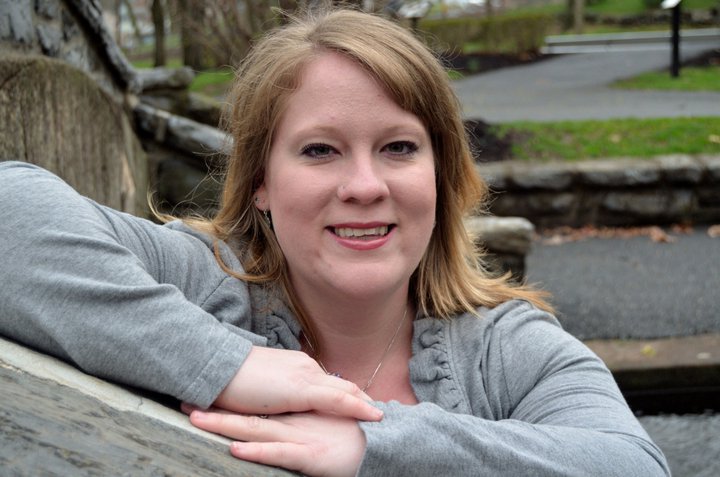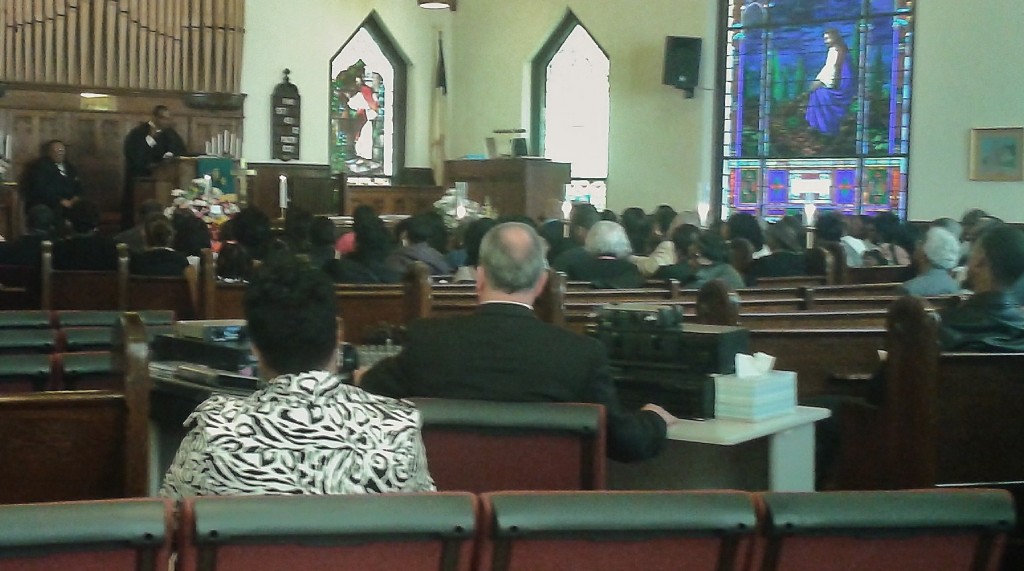Miscellaneous
When You Feel Guilty for Having a Good Day
Today’s guest post is from Brenda Lee. This post was written on November 11th, 2008 … two weeks after her husband’s death.
*****
I kind of feel guilty saying this, but overall, today was a good day. Despite not wanting to get up this morning (facing the official 2 weeks since…), I eventually got my bum moving and went to lunch with a great friend. Afterwards, I went to the interview and it went surprisingly well. I have no clue if they’ll hire me, but they’re flexible with when I want to start. The only concern I have is I think it’s only 20 hours instead of 24, which means I may not qualify for benefits. So…we’ll just see what I’m offered and go from there.
Tonight I got out of the house with a friend for coffee and it was just GOOD. One vice I have picked up is a new coffee addiction, but I figure that’s better than any of the alternatives!
Pray for Linda as she had a rough day and really needs support. We all have bad days and good days, and, of course, they aren’t always going to correlate.
I’m very adament about taking my own timeline on things. After discussing everything with my friends today, I am on the “right” track. The fact is, for the past 4 months my minute by minute job was taking care of Kevin. That WAS my job whether it was official employment or not.
My life is gone. I don’t say this to sound hopeless, because I am not hopeless. In fact, for whatever reason, God handed me a clean slate, a new life. As much as I want my old one back, I don’t have a choice. I no longer have a job, a home (that’s “mine”), a husband, a routine, even my car is different. The only thing I have left is faith, family and friends. My triple f, which is helping me immensely.
So, for me to go to a “routine” and “get back in the swing of things” isn’t going to happen. There is no SWING OF THINGS. As I said, I am hopeful, but it’s not going to be easy. Everything I do from here on out is new and different and will take even more time adjusting to. Starting a new job is NEVER easy, let alone when you’re an emotional basketcase and a new widow. In time, I’ll want to find my own place, in time, I’ll have a new routine. In time.
So….in time, this will happen. But I’m not going to rush it. I’m going to take weeks…maybe even months to “get back in the swing of things”. I am putting this out there because for me, finding a job, a “routine” isn’t really helpful to me right now. It scares me to death, and trust me, I’m finding things to fill my time with. I don’t have an immediate need to go back to work, to set a schedule. My immediate life right now is getting through each minute and doing things for myself.
..and that’s what I need to do. So thank you for respecting that and giving me this time. Thank you for allowing me this because this is all I need right now. Faith, family and friends. Everything else will fall into place as it is supposed to, and I’m not going to rush a thing.
So..it’s been a good day. And I pray tomorrow will be as well.
*****
Brenda Lee is a freelance writer and blogger whose topics include travel, events, and businesses in central Pennsylvania. Widowed at just 24, Brenda is now an advocate for sarcoma cancer, and is working to change how society discusses grief and accepts those grieving at an early age. She is an award winning writer and is currently editing the first draft of her memoir, “Keepin’ it Kevin” detailing her love and loss story.
You can connect with her on Facebook, on Twitter and at her blog.
Yesterday I Saw the Body of Christ at a Funeral …
… and I took a picture of it.
There’s only two white guys in this picture: the one is the white pastor who is sitting beside the soundboard. The other is the white Jesus engraved in the stain glass. The rest are African American.
There’s a white Jesus in stained glass because this is a white church, that has had 30 plus pastors in it’s history, all of whom have been white.
And today the church is full of African Americans in a white church for a funeral.
The Mt. Zion AME church is in the process of being renovated. And this week the Mt. Zion AME church lost not one but two of their members.
The Parkesburg United Methodist Church opened their doors, their sanctuary and their cafeteria hall for not one, but both funerals.
African Americans in a white church where the white pastor isn’t in the pulpit, but serving the black female pastor in the pulpit by running the soundboard. In fact, he was serving since 8 AM in the morning when he helped carry the casket up the two flight of steps and into the sanctuary; when he vacuumed the entire sanctuary at 9 AM; extended gracious hospitality from 10 AM to 11 AM; and even organized five members of the auxiliary crew to set up plates and places for 100 plus people for the post funeral luncheon in the cafeteria hall.
This is how unity is supposed to work.
One hundred years ago, this wouldn’t have happened. Fifty years ago … maybe even 10 years ago this wouldn’t have been considered. But today I witnessed it. I witnessed the body of Christ.
Silent Grief
Today I’m privileged to feature a post by Erica McNeal.
Ever since I wrote “Learning from Michelle Duggar”, I’ve come to recognize that there needs to be voices for the many women and men who struggle through the silent grief of miscarriages and still births. I’ve come to realize that for many it’s hard to share for fear that no one will listen; after all — as I’ve heard too many times — “it’s no big deal … it’s just a miscarriage”.
It’s even harder to mourn in that loneliness; but it needs to be done. The pain and grief needs to be vocalized. That’s why I’m so glad that there’s people like Erica who are both sharing and mourning. Thank you, Erica. We need your voice!
*****

Erica McNeal
As I sat in the church pew yesterday, there were little babies all over the place. Two to my left, two to my right, two behind me and one in front of me.
I thought of Kylie.
Deep breath.
As the music played, I fought my tears.
Out of the corner of my eye, I noticed movement and saw two little girls, playing with their brother. Two little girls and a boy… what could have been…
I looked up at the lighted cross in hopes of distracting myself.
I thought of a concert my husband and I went to as Steven Curtis Chapman bravely sang, “Cinderella”; the very song he had written for his own daughter before her tragic death. My husband had looked up at a similar cross in hopes of distracting himself from the emotion of this song. But, instead, when he saw the cross that day, he envisioned Jesus holding our little girl.
This is what the cross reminded me of today. And, the tears began to form.
At the exact same time when I thought about how empty my arms felt and how much my heart ached, my husband handed me a seven-month old baby girl to hold for our friend who needed a hand.
“How Great is Our God” began to play. The very song that kept me on my feet after our failed adoption of JT, and the song that became our adopted son’s namesake.
Tears flowed as I snuggled this sweet little girl. What a beautiful moment and gift from God.
Those of us that experience the loss of a child don’t just grieve their death. We grieve the broken hopes and dreams we had for our child and our family. We grieve all of the moments that will never be. We grieve the empty crib, the clothes that may never be worn, and the toys that may never be played with. We grieve the day we will never walk our daughter down the aisle, or watch our son hit his first baseball. We grieve the empty void that lives on and remains in our family. It is an ongoing, silent grief, that comes without warning every time we realize that another dream or hope has been crushed.
Our grief journeys through jealousy of others to bittersweet joy; from gut-wrenching heartache, to helping those who have experienced a similar tragedy. And yet, our journey is highly unpredictable and deeply personal. We often grieve silently so as not to make others feel uncomfortable or awkward. We take deep sighs, ponder our thoughts for a moment, and press forward, hoping that the tears we shed are not too obvious. Because, in reality, our grief really has nothing to do with other people, and what they do or don’t have.
Our grief is about what we wish we could still hold, and talk to, and hug, and snuggle, instead of what is solely imprinted in our hearts and minds.
And yet…
I find HOPE in a Redemptive Savior whose own silent Suffering in the Garden of Gethsemane caused Him to sweat drops of blood. He’s been there!
He understands a silent grief more intense than I will ever know.
And this fills me with COMFORT knowing that my deepest sighs and silent tears will never go unnoticed by God!
(Psalm 139:1-22, 2 Kings 20:5)
*****
ERICA’S BIO: Erica McNeal is a three-time cancer survivor, who has also experienced the loss of five children, two of which she held in her arms. She is the author of Good Grief!, a resource guide that stands in the gap between people who are hurting that don’t know what they need, and their loved ones who have no idea how to help. Erica has also shared her life experiences as a guest speaker in ten different states to churches, women’s groups, and military leadership groups.
Erica’s vision is to challenge the Christian line that states God will not give us more than we can handle because she believes that God will allow us to be stretched beyond our human capabilities in order to show us our need for Him, to deepen our faith, and to show us that HIS strength is limitless!
You can subscribe to her blog and follow her on twitter.
Unempty Moments
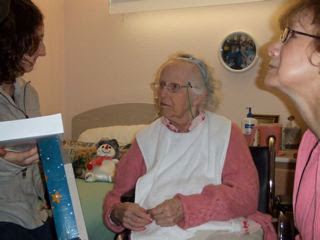
Aly, her mother and grandmother
I can’t remember anything but her underwear.
I can’t remember the day or even which convalescent facility we were in. I can’t remember what my mom was telling me or what I was wearing.
What I can remember is her underwear. They were big, literally granny panties. Soft cotton. Conservative white and new baby pink. No lace or ruffles.
I can remember how they folded softly in my mom’s hands. She caressed them absentmindedly as she spoke.
We were moving my grandmother into a new facility.
We were in the repeat-the-same-question-every-five-minutes stage of her dementia, not yet to the frantic wheelchair racing or the evergreen season of suspicion. She hadn’t yet looked desperately into my eyes and asked if I could find her mother.

Aly and her mother
But still, we were scared, my mom and I. Missing the mother and grandmother we once knew. The woman who remembered her legendary spaghetti and meatballs recipe and walked loops around her apartment complex with friends bearing names like Petey or Marge.
The fear hung silent between us as we unpacked her clothes, a few books, some pictures of toothy grandchildren for her bedside table.
Henri Nouwen talks about patience as one of the cornerstones of the compassionate life; impatience the deterrent that keeps us tapping our feet, checking our watches, and missing the glory of God.
By this point in the story, (like you I venture to presume) I should have been tapping my feet, checking my watch and writing off another summer afternoon as “empty, useless, meaningless.”
But I didn’t.
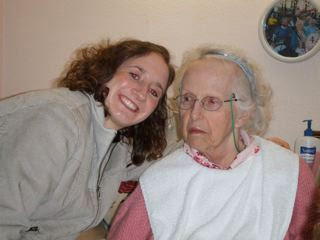
Aly with her grandmother
The counterpoint to impatience, Nouwen describes another rendering of time when we experience the moment as “full, rich, and pregnant.” When “somehow we know that in this moment everything is contained: the beginning, the middle, and the end; the past, the present and the future; the sorrow and the joy; the expectation and the realization; the searching and the finding.”
This was one of these moments. Watching my mom delicately fold my grandmother’s underwear. In this moment I was gripped by the thought that love need be nothing more than this simple, intimate act.
It became an unempty moment.* A moment I didn’t want to get away from. A moment filled with the glory of God.
To this day, this afternoon represents a rupture for me. A rupture that signaled not a fracture, but a deepening. A deepening love for my grandmother. A deepening respect for my mom. And a deepening gratitude for every humdrum moment-turned-miracle I had left with both of them, together in one room, folding underwear, in an unempty moment.
****
*Precious moments was already trademarked.
****
Aly Lewis is a twentysomething writer from San Diego, Ca. When she’s not writing ridiculously witty and yet still thoughtful and inspiring copy for the international non profit Plant With Purpose, you can find her roller blading, showing off her dope hip hop moves, or overanalyzing her quarter life crisis. She has a passion for social and ecological justice, anyone who speaks Spanish, and experiencing the God of the unexpected. You can check out her mismatched musings on life here: http://memoirsofalgeisha.blogspot.com/.
And make sure you are one of the first followers of Aly’s newly hatched Twitter account!
On Not Knowing Where Your Dad is Buried
Today’s guest post is from Lisa Colón DeLay, who describers herself as “CREATIVE, NINJITSU INTERVIEW PRACTITIONER, IMPROMPTU HUMORIST, DISPENSER OF FREE SAVVY, SPIRITUAL FORMATION PROVOCATEUR.” You can stalk her on Facebook, follower her on Twitter and visit her blog. But, be forewarned, if you attempt any form of stalkery, her Ninja skills will find you out.
****
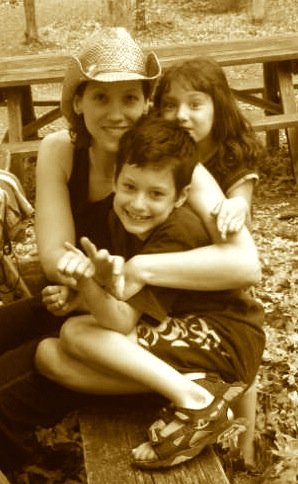 The long and drawn out precursor to my father’s death is something out of a bad made for TV movie. It has all the twists, turns, and unbelievability that would make a most incredulous 90 minutes on the small screen. After all, how many people do you know incur a brain stem infarction (kind of like a stroke, but much creepier and not nearly as well-known) only to live through it, become permanently brain injured, and profoundly disabled (think: Terri Schivo). Then comes the 11 year grieving process as he physically wastes away in a nursing home, battling countless infections. At the onset, I was 20 and my father was 44. You can’t make stuff like this up. And I didn’t even mention the lawsuits.
The long and drawn out precursor to my father’s death is something out of a bad made for TV movie. It has all the twists, turns, and unbelievability that would make a most incredulous 90 minutes on the small screen. After all, how many people do you know incur a brain stem infarction (kind of like a stroke, but much creepier and not nearly as well-known) only to live through it, become permanently brain injured, and profoundly disabled (think: Terri Schivo). Then comes the 11 year grieving process as he physically wastes away in a nursing home, battling countless infections. At the onset, I was 20 and my father was 44. You can’t make stuff like this up. And I didn’t even mention the lawsuits.
Death and its many friends wreak havoc on an already shattered family. The details are scandalous, but not as important or profound as a memorial service with no body with whom to part. The trouble isn’t so much the service or the memorializing, it’s not being told where they laid him. It’s not just me–it bothered Mary Magdalene quite a bit too. My step mother still sends Christmas and Easter cards, but she’s never told me where my father’s ashes are buried. He could be on her mantle, for all I know, or interred at a secret place as a result of paranoia. A bit of spite can go a very long way.
And so what resurrects is not a hope in seeing my dad’s resting place, but rather in understanding that many, if not most things in life remain outside of my control. Even things one would consider simple and common.
I’ve thought about what I’d do if I knew where my father was buried. In the movies it’s always raining when they bury someone. Later when people visit the grave, it’s usually breezy. It’s warmer out too, which is nice. I would pick a mild day. 72º and mostly sunny. I’ve pictured myself putting notes, or flowers, or photos near the headstone. Praying as a sit in the grass near the site, or singing. A grave doesn’t help the one who died, I’ve realized. It helps the one who’s left behind.
Transforming from the bruised hopes of a missed connection with a departed loved one, I think more about the living now, not the dead. And about my own living. Some of that I can and should control. Photos and memories take the place of a gravestone, and I try to do right by how my dad would want me to think about the situation.
He’d want me to be gracious. He’d want me to remember not where he was buried, but how he loved me, and the better parts of how he lived. And that is actually the same thing I want for my own children. The bigger lesson is in the living memory, not the ground marker. (I say this to myself when I’m feeling particularly strong.)
Maybe the marked spot would trap me somehow the way an unknown spot never can. Maybe it’s not so savage after all. Maybe I can find a gift in the pile of manure. With a Living God this is possible.
I wish for everyone to get whatever they need in the process of grief. I understand what mementos mean. They are precious things because they signify something that mattered. They honor what was lost. But for those who have nothing to call a burial place for someone they love, I wish for freedom from that sort of extra hurt. I wish for something bigger and life-giving to grow out of that tender spot.
